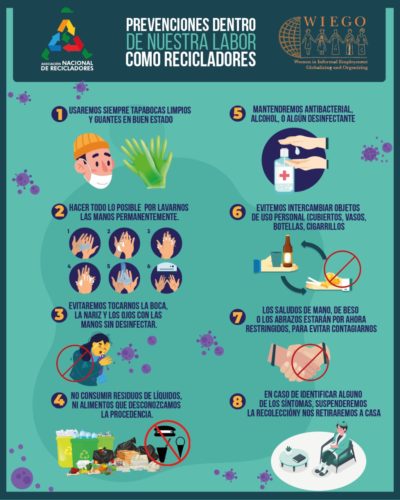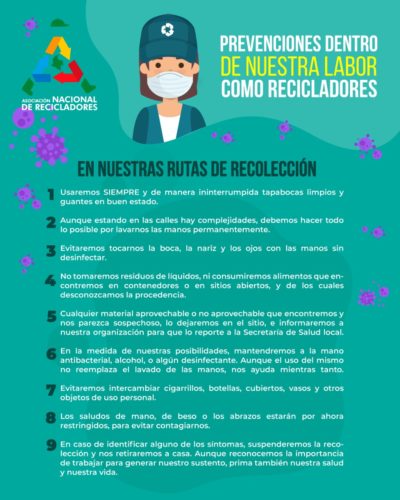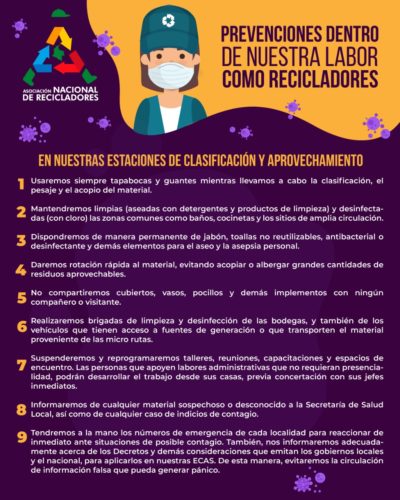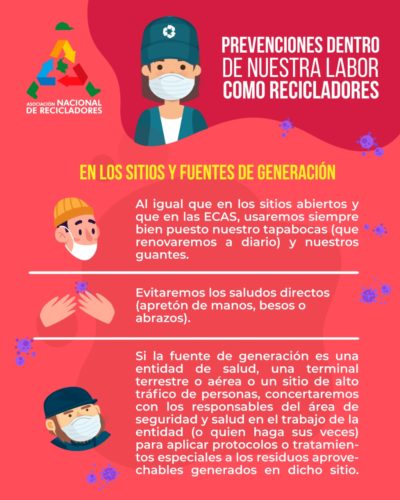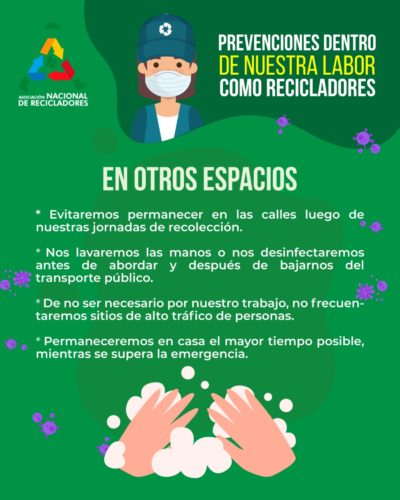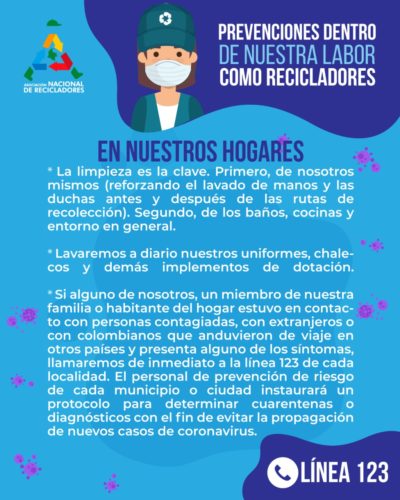Posted by International Alliance of Waste Pickers
Written by ANR
March 19, 2020
Fellow Waste Pickers:
The following are some recommendations to prevent the spread of the Covid-19 virus (Coronavirus) in our work as public service providers of Recyclables management, within the framework of the Public Waste Management Service in Colombia.
What is Covid – 19 or Coronavirus?
It is a highly infectious disease caused by some viruses of unknown origin, which cause acute respiratory infections (moderate or severe flu). It is transmitted like all the flus by contact with infected people who cough, sneeze, or expel particles of the virus in the environment (Not all flus are Covid-19) but it is better to protect yourself.
Why is it highly dangerous?
The World Health Organization has declared Conavid-19 a Pandemic or public health emergency of international importance. In other words, an epidemic that is spreading in several countries at an accelerated rate, without being easily halted, threatening the life and integrity of human beings. There is currently no vaccine or specific treatment to combat it.
Who are the people most susceptible to infection?
While anyone can be at risk for coronavirus, the elderly (people over 60) are the population group with the highest rate of infection. Also, those who are in permanent contact with personnel working in high traffic sites from other countries (airports, transportation terminals), as well as individuals with chronic respiratory diseases (such as asthma), diabetics, hypertensive patients, HIV carriers and people with low defenses. Although not life-threatening, those who have previously suffered from diseases such as those mentioned may suffer life-threatening complications.
How to identify the symptoms?
Not all common flus are necessarily coronaviruses. People who are infected will have difficulty breathing, fever (greater than 37.5° and present for three or more days), cough, nasal secretions (mucus) and body discomfort (fatigue).
If during the routes of exploitation or the stay in the sources of generation of exploitable waste we have had contact with foreigners or Colombians who have been travelling, it is necessary to be attentive to the presentation of some of the mentioned symptoms.
What can we do to prevent infection?
The first measure we should apply is to carry out and permanently reinforce the washing of our hands with water and soap several times a day, in the following way:
- Wet your hands with clean water. Turn off the tap and apply soap
- Rub your hands together until the soap foams and spreads
- Scrubbing your hands for at least 30 seconds
- Rinse your hands thoroughly
- Dry your hands with clean towels, or air-dry
Second, we will avoid contact with people who are sick, or who are suspected of carrying the Covid-19 virus.
Thirdly, when coughing or sneezing, cover yourself with your arm (inside of your elbow), and not with the palms of your hands, your fingers, you should always cover yourself.
As a fourth measure, we will reinforce at home the cleaning of kitchens, bathrooms and common places. Initially, we use detergent (to clean or remove dirt and grime) and then, a solution of water with chlorine (four tablespoons per one liter of water to disinfect and eradicate germs, viruses and bacteria). All of the above, always using cleaning gloves and mouthpieces.
And how should we waste pickers act in our daily lives to avoid contagion?
1. On our collection routes: (streets, shuts and waste collection rooms):
- We will ALWAYS and uninterruptedly use clean mouthpieces and gloves in good condition.
- Although being in the streets there are complexities, we must do everything possible to wash our hands permanently.
- We will avoid touching our mouth, nose and eyes with our hands without disinfecting them.
- We will not take any liquid residues, nor will we consume food that we find in containers or in open places, and of which we do not know the origin.
- Any usable or unusable material that we find and that seems suspicious to us will be left on site, and we will inform our organization so that it can report it to the local Secretary of Health.
- As far as possible, we will keep on hand antibacterial, alcohol, or some disinfectant. Although the use of this does not replace hand washing, it helps us in the meantime.
- We will avoid exchanging cigarettes, bottles, cutlery, glasses and other personal items.
- Handshakes, kisses and hugs will be restricted for now, to avoid getting infected.
- If any of the symptoms are identified, we will stop the collection and go home. Although we recognize the importance of working to generate our
- livelihood, our health and our lives also take precedence.
2. In our Classification and Recycling Stations (ECA,s) (Recycling Warehouses):
- We will always use mask and gloves while carrying out the classification, weighing and collection of the material.
- We will keep the common areas such as bathrooms, kitchens and places with wide circulation clean (cleaned with detergents and cleaning products) and disinfected (with chlorine).
- We will permanently dispose of soap, non-reusable towels, antibacterial or disinfectant and other elements for personal hygiene and cleanliness.
- We will give a quick rotation to the material, avoiding to store or to lodge great amounts of usable remainders.
- We will not share cutlery, glasses, wells and other implements with any partner or visitor.
- We will carry out cleaning and disinfection brigades for the warehouses, and also for the vehicles that have access to generation sources or that transport the material coming from the micro routes.
- We will suspend and reschedule workshops, meetings, trainings and meeting spaces. People who support administrative tasks that do not require presence, may develop the work from their homes, after consultation with their immediate bosses.
- We will report any suspicious or unknown material to the Authorities (Local Health Secretary), as well as any case of signs of contagion.
- We will have the emergency numbers of each location at hand to react immediately to situations of possible contagion. Also, we will be properly informed about the Decrees and other considerations issued by the local and national governments, to apply them in our ECAS. In this way, we will avoid the circulation of false information that could generate panic.
3. On sites and sources of potentially recyclable waste generation (proposed)
- As in the open spaces and in the ECAS (recycling warehouses) , we will always wear our mask (which we will renew daily) and our gloves.
- We will avoid direct greetings (handshakes, kisses or hugs).
- If the source of generation is a health entity, a land or air terminal or a site with high traffic of people, we will agree with those responsible for the area of safety and health in the work of the entity (or whoever does their job) to apply protocols or special treatments to the waste generated in that site.
4. In other spaces:
- We’ll avoid staying on the streets after our collection days.
- We will wash our hands or disinfect ourselves before boarding and after getting off public transport.
- If it is not necessary because of our work, we will not frequent places with high human traffic.
- We will stay at home as long as possible, while the emergency is being overcome.
5. In our homes:
- Cleanliness is the key. First, of ourselves (reinforcing hand washing and showers before and after the collection routes). Second, of the bathrooms, kitchens and environment in general.
- We will wash our uniforms, vests and other equipment daily.
- If any of us, a member of our family or a member of our household has been in contact with infected persons, foreigners or Colombians who have been travelling in other countries and presents any of the symptoms, we will call immediately the line 123 of each locality. The risk prevention personnel of each municipality or city will establish a protocol to determine quarantines or diagnoses in order to avoid the spread of new cases of coronavirus.
Colombian Waste Pickers: It is up to us to implement the appropriate measures to prevent the spread of the Coronavirus!
Tweet


